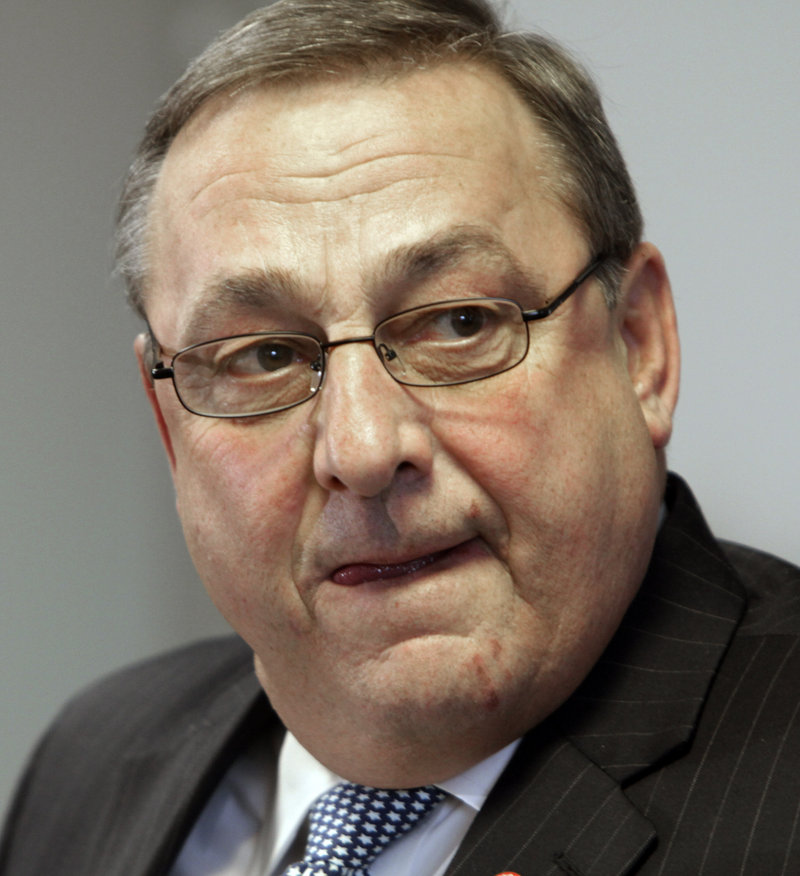Gov. Paul LePage never personally saw the mural he ordered removed from Maine’s Department of Labor headquarters in March, according to a document filed in federal court Thursday.
LePage, nevertheless, asked the court in a separate filing Thursday to throw out a lawsuit seeking to reverse his decision and bring the painting back.
LePage made national news and angered labor advocates when he ordered the multipanel mural taken down March 27 because it was “one-sided” against business. The decision prompted a federal lawsuit by five Mainers who say the governor violated the First Amendment by restricting free speech.
The fact that LePage never actually saw the artwork was included in a stipulation of undisputed facts filed Thursday in U.S. District Court in Bangor. The Maine Attorney General’s Office filed the stipulation after reaching agreement with the plaintiffs on the basic circumstances leading up to the dispute.
LePage decided to take down the depiction of Maine’s labor history after receiving an anonymous written complaint that the mural was “nothing but propaganda to further the agenda of the union movement.”
His senior economic adviser, John Butera, had seen the mural and considered it to be “pro-labor and anti-business,” according to the court filing.
“You would think that the governor would want to be fully informed before he makes a decision,” said Jeffrey Neil Young, an attorney for the plaintiffs. “And given the controversial nature of the decision … you would think he would want to see something himself before he condemns it.”
Adrienne Bennett, spokeswoman for LePage, said the fact that LePage had not seen the mural was not a revelation, but she declined to comment on the controversy.
“It’s going through the process and we’ll let the courts handle it from this point,” she said.
The plaintiffs sued LePage on April 1, and soon after asked the court for a temporary restraining order to have the mural put back, pending a final ruling.
In a 45-page decision April 22, Justice John Woodcock Jr. rejected the restraining order, saying state-owned works of art are “government speech” and political leaders are entitled to select the art that’s displayed in state offices.
The plaintiffs are moving forward with the lawsuit despite the preliminary decisions against them. The fact that LePage never saw the mural is not likely to affect the outcome, which hinges on a more technical argument: Whose speech is protected in this case?
“The key questions is, how would the reasonable person view the artwork: as the speech of the government or the speech of the artist?” Young said.
The plaintiffs say that the mural clearly reflects the views of the painter, and that the government cannot take down a public art display simply because it doesn’t share the artist’s views.
“You can remove art because you think it’s lousy art, but not because the message is one that you disagree with,” Young said.
Attorney General William Schneider, who is defending LePage’s decision, argued in his dismissal motion Thursday that people who saw the mural viewed it as a statement by the government, which is entitled to free speech. Government speech can include removing a mural as well as putting it up, he said.
The mural “was physically overwhelming in the small space of the anteroom, making it difficult to believe that this was not a message that observers would view as that of the government, much like a monument,” Schneider’s motion says. “The message of the government is determined at the ballot box, and if plaintiffs do not like what the present administration is saying, their course of action is a political one, not litigation.”
The plaintiffs have three weeks to respond to Schneider’s motion for summary judgment. Meanwhile, the mural remains in storage at an undisclosed location.
“The mural is stored safely in an appropriate, climate-controlled environment,” Schneider’s motion says. “Although there were several ideas regarding hanging the mural elsewhere, those are now on hold pending the outcome of this litigation.”
Staff Writer John Richardson can be contacted at 791-6324 or at:
jrichardson@pressherald.com
Send questions/comments to the editors.



Success. Please wait for the page to reload. If the page does not reload within 5 seconds, please refresh the page.
Enter your email and password to access comments.
Hi, to comment on stories you must . This profile is in addition to your subscription and website login.
Already have a commenting profile? .
Invalid username/password.
Please check your email to confirm and complete your registration.
Only subscribers are eligible to post comments. Please subscribe or login first for digital access. Here’s why.
Use the form below to reset your password. When you've submitted your account email, we will send an email with a reset code.